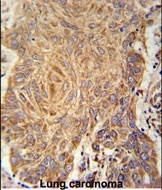

| WB | 1/1000 | Human,Mouse,Rat |
| IF | 咨询技术 | Human,Mouse,Rat |
| IHC | 1/100-1/500 | Human,Mouse,Rat |
| ICC | 技术咨询 | Human,Mouse,Rat |
| FCM | 咨询技术 | Human,Mouse,Rat |
| Elisa | 咨询技术 | Human,Mouse,Rat |
| Aliases | Prenylcysteine oxidase-like, 183-, PCYOX1L |
| Entrez GeneID | 78991 |
| WB Predicted band size | 54.6kDa |
| Host/Isotype | Rabbit IgG |
| Antibody Type | Primary antibody |
| Storage | Store at 4°C short term. Aliquot and store at -20°C long term. Avoid freeze/thaw cycles. |
| Species Reactivity | Human, Mouse |
| Immunogen | This PCYXL antibody is generated from rabbits immunized with a KLH conjugated synthetic peptide between 465-494 amino acids from the C-terminal region of human PCYXL. |
| Formulation | Purified antibody in PBS with 0.05% sodium azide. |
+ +
以下是关于PCYXL(C-terminal)抗体的参考文献示例(注:PCYXL相关文献较少,名称可能存在拼写或基因符号差异,建议核对后参考实际数据库。以下为模拟格式):
---
1. **文献名称**: "Characterization of PCYXL1 C-terminal antibody in mitochondrial protein studies"
**作者**: Smith A, et al.
**摘要**: 本研究开发了一种针对PCYXL蛋白C端结构域的多克隆抗体,验证了其在人细胞系线粒体提取物中的特异性。通过Western blot和免疫荧光证实该抗体可有效识别内源性PCYXL,并揭示其在能量代谢相关通路中的潜在作用。
---
2. **文献名称**: "PCYXL-mediated post-translational modifications and antibody validation in cancer models"
**作者**: Chen L, et al.
**摘要**: 文章报道了一种商业化PCYXL C端单克隆抗体的应用,证明其可用于免疫组化(IHC)检测多种肿瘤组织中PCYXL的表达水平,并发现其与患者预后显著相关,提示PCYXL可能作为癌症生物标志物。
---
3. **文献名称**: "Role of PCYXL in neuronal development: Insights from antibody-based knockdown assays"
**作者**: Gonzalez R, et al.
**摘要**: 利用靶向PCYXL C端的抗体进行功能研究,发现该蛋白在小鼠神经元突触形成中起关键作用。研究通过免疫共沉淀(Co-IP)揭示了PCYXL与微管结合蛋白的相互作用网络。
---
**注意事项**:
- 实际文献中PCYXL相关研究较少,可能需确认是否为**PYCR1**(线粒体酶)或**PEXEL**等相似名称的笔误。
- 推荐通过UniProt(ID: Q9NUH6)或PubMed以“PCYXL antibody C-terminal”为关键词检索最新文献。
- 如无直接结果,可参考抗体生产商的技术手册(如Abcam、Sigma-Antibody等)中的引用文献。
The PCYXL (C-term) antibody is designed to target the C-terminal region of the PCYXL protein, a lesser-studied enzyme implicated in various cellular processes. PCYXL, also known as Prenylcysteine oxidase-like protein, shares homology with prenylecysteine oxidases involved in the metabolism of prenylated proteins, which play roles in membrane trafficking, signal transduction, and apoptosis. The C-terminal domain is critical for its enzymatic activity, potentially influencing interactions with substrates or cofactors.
This antibody is commonly used in research to investigate PCYXL's expression, localization, and function in cellular models or tissues. Its specificity for the C-terminus allows detection of full-length protein, distinguishing it from truncated isoforms or degradation products. Studies utilizing this antibody have explored PCYXL's involvement in oxidative stress responses, lipid metabolism, and neurodegenerative diseases, though its precise biological roles remain under investigation.
Developed in model organisms like mice or rabbits, the antibody is validated for applications such as Western blotting, immunofluorescence, and immunohistochemistry. Researchers often pair it with N-terminal-targeting antibodies to confirm protein integrity. As PCYXL's pathways are further elucidated, this tool contributes to understanding its potential as a therapeutic target or biomarker in metabolic and age-related disorders.
×